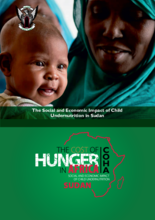
Led by the African Union Commission (AUC), and implemented by its Member States, the COHA study is supported by the African Union Development Agency (AUDA-NEPAD) in collaboration with the United Nations Economic Commission for Africa (UNECA), the United Nations Economic Commission for Latin America and the Caribbean (ECLAC) and the United Nations World Food Programme (WFP).
The COHA study is a continental initiative aimed at estimating the social and economic impacts of child undernutrition in Africa focusing on the health, education and labor sectors. It provides governments and partners with key actionable and time-bound priority recommendations to improve the lives of children across the continent. The findings of the study provide sound evidence to inform policy dialogues and increase advocacy around the importance of preventing child undernutrition.
So far, twenty-one (21) countries have completed the study- Burkina Faso, Chad, DRC, Egypt, Eswatini, Ethiopia, Gambia (The), Ghana, Kenya, Lesotho, Madagascar, Malawi, Mali, Mauritania, Mozambique, Niger, Rwanda, Sudan, Uganda and Zimbabwe.
According to the findings of these studies: a) 8 to 44% of all child mortality is associated with undernutrition; b) between 1 to 18% of all school repetitions are associated with stunting; c) stunted children achieve 0.2 to 3.6 years less in school education; d) child mortality associated with undernutrition has reduced national workforces by 1 to 13.7 %; and e) 40 to 67% of the working age population suffered from stunting as children.
The total estimated yearly cost of undernutrition in these countries, in terms of GDP, varies from 2% (for Egypt) to 17% (for Ethiopia). Improving the nutritional status of children is a priority that needs urgent policy attention to accelerate socio-economic progress and development in Africa.
| Document | File |
|---|---|
| Download pdf - (2.5 Mb) |
PDF | 24.9 MB
Download
|

